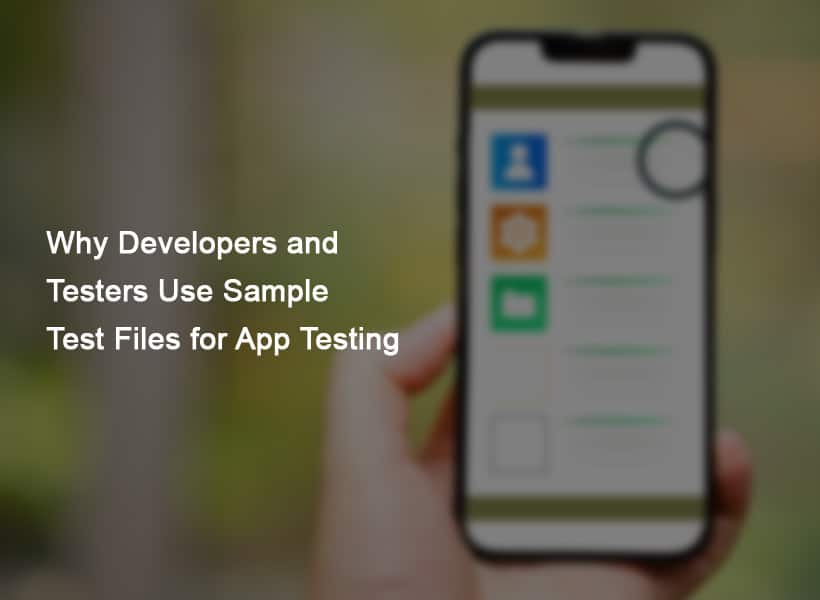Why Developers and Testers Use Sample Test Files for App Testing

When you’re building an app or website, making sure everything works properly is super important—especially when it comes to handling files like images, documents, and videos. That’s where sample test files come in handy. These are example files that developers and testers use to check if a feature is working correctly.
In this article, we’ll explain what sample test files are, why they matter, and how developers and testers use them to make apps better, safer, and easier to use.
What Are Sample Test Files?
Sample test files are just regular files—like a photo, PDF, text file, or even a video—that are used during testing instead of real user data. Think of them as practice files. They help developers and testers see how their app reacts when someone uploads or downloads something.
They can be:
- Text documents (.txt, .csv)
- Images (.jpg, .png)
- PDFs, Word files
- Audio or video files
- JSON or XML files for APIs
You can either download these from trusted sites or make your own.
Why Developers Use Sample Files
1. To Test Real-Life Scenarios
Let’s say you’re building a photo-sharing app. You need to test if users can upload photos properly. Instead of waiting for real people to use your app, you can try uploading some sample photos yourself. That way, you’ll see what works—and what doesn’t—before launch.
2. To Fix Bugs Quickly
If something goes wrong, it’s easier to test again and again with the same file. For example, if a video file isn’t uploading correctly, you can use the same sample video to find out what’s causing the problem. A Ruby on Rails development company often uses these sample test files to automate upload and validation processes, ensuring apps handle different file types seamlessly before going live.
Why Testers Love Sample Files
1. They Cover All the Angles
Testers don’t just test the “happy path.” They try to break things—on purpose! They’ll use sample files with:
- Special characters
- Really big file sizes
- Wrong or broken file formats
This helps them check how the app reacts to unexpected situations.
2. They Check Security Too
It’s not just about uploading files. Testers also make sure that the app is safe. Some files are created just to see if an app can handle risky behavior, like hidden viruses or wrong file extensions.
3. They Test Limits
Every app has rules—like “only upload images under 5MB.” Testers use sample files to make sure the app enforces these limits and gives proper error messages if something’s wrong.
Benefits of Using Sample Test Files
Using test files saves a lot of time and hassle. Here’s why they’re useful:
- Faster Testing – No need to wait for real users or data. You can start testing right away.
- Consistent Results – Everyone on the team can use the same files, so results are easier to compare.
- Safe for Testing – You’re not using real user data, so there’s no risk of leaks or privacy issues.
- Great for Automation – Sample files can be used in automated tests to check the app after every update.
Common Sample Files Developers Use
Here are a few examples of the types of sample files used during testing:
| File Type | What It’s Used For |
| .txt, .csv | Simple text input testing |
| .jpg, .png | Image upload testing |
| .pdf, .docx | Document handling |
| .mp3, .mp4 | Audio/video playback testing |
| .json, .xml | API request/response checks |
| .zip | Compression testing |
Where to Find Free Sample Test Files
Here are some websites where you can download free test files safely:
- FreeTestData.com – Offers videos, images, audio, and docs
- Filesamples.com – A variety of file types
- Generatedata.com – Create your own fake data
- GitHub sample file repositories – Search for sample files shared by other devs
- W3C UTF-8 Test Files – Great for testing text encoding
SEO Keywords to Include
Here are some keywords that help this article rank well in search engines:
- sample test files for developers
- dummy files for testing
- file upload testing examples
- free download test files
- application testing with sample files
Use them naturally in the content, meta title, and description.
Final Thoughts
Whether you’re a developer building the next big app or a QA tester trying to catch bugs, sample test files make life easier. They help simulate real-world situations without needing real data. You can spot issues, check performance, and test features before going live.
So next time you’re working on an app that needs file uploads, downloads, or media handling, grab a few sample files and start testing smart.


